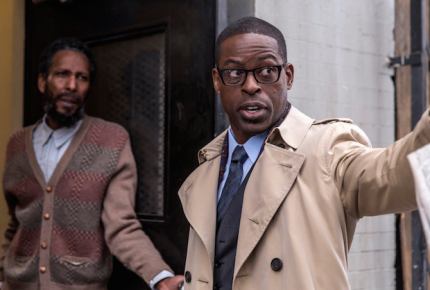
This post contains spoilers! If you have not yet watched the premiere of “This Is Us” head on over to NBC’s website, and come back in 45 min. Be sure to have your tissues ready.
 It’s been a long time since I watched, let alone looked forward to, a network-produced TV show. HBO and Netflix have been dominating the silver screen of late, while NBC, ABC and the like have become channels necessary only for viewing sporting events (which, let’s be honest, I never do on my own accord). But NBC drew me in during the Olympics, when they aired (repeatedly) the trailer for their new show, This Is Us. I kept my interest to myself knowing my husband would roll his eyes—the show’s blatant efforts to tug on the heart strings is not exactly his cup of tea when it comes to television—but I found myself home alone at 9:45pm on Tuesday night, awaiting the show’s premiere.
It’s been a long time since I watched, let alone looked forward to, a network-produced TV show. HBO and Netflix have been dominating the silver screen of late, while NBC, ABC and the like have become channels necessary only for viewing sporting events (which, let’s be honest, I never do on my own accord). But NBC drew me in during the Olympics, when they aired (repeatedly) the trailer for their new show, This Is Us. I kept my interest to myself knowing my husband would roll his eyes—the show’s blatant efforts to tug on the heart strings is not exactly his cup of tea when it comes to television—but I found myself home alone at 9:45pm on Tuesday night, awaiting the show’s premiere.
My interest had been further piqued by James Poniewozik’s review in Monday’s New York Times Arts section, in which he compared This Is Us to Mbird favorites Parenthood and Friday Night Lights, and referred to its “skillful, shameless tear-jerking.”
Watching “This Is Us” is like getting beaten up with a pillow soaked in tears… It presents, in one hour, birth, death, reunion, career crisis, self-doubts, self-affirmations, heart-to-hearts, reconciliations. It wants to make you weep and it does not play fair. It will leave no button on your psychic control panel unwashed.
He had me at ”pillow soaked in tears”! That uncanny ability to take me for a journey through emotional heights and depths, to offer time and space for a cathartic cry, yet to leave me feeling hopeful, is what I miss most about Parenthood. Such raw vulnerability and honest depiction of just how hard life can be (a la Theology of the Cross) is pretty rare to see on TV, so I had high hopes and expectations for Tuesday night’s premiere.
The pilot episode revolves around 4 characters who share a birthday, and, when we meet them, are all turning 36. While each sub-plot is compelling in its own right, it was the moment about 12 minutes in, when one of the birthday men is watching his daughters play soccer, that I officially decided I liked the show. The younger daughter is kneeling down in the middle of the field, French braiding her friend’s hair while her teammates play the game around her. On the neighboring field, the older daughter is the star of the show, bordering on being too aggressive, too competitive. My jaw dropped. I laughed out loud. This was me and my older sister! She, uber-competitive and ultra-sporty, me, physically able to play but lacking competitive drive, preferring instead to pick wildflowers or turn cartwheels in the outfield during T-ball games (true story).
 Half an hour later, the end of the episode delivered quite the surprise, setting the stage for what could be a great show. Serendipity, providence, or the Holy Spirit—take your pick— intervened, so that in the exact moment a new father gazed upon his two newborn babies, while mourning the loss of his still-born triplet, another baby was dropped off in the hospital nursery, having been abandoned at a fire station. First thing Wednesday morning, at my weekly bible study, the true depth and theological heft of this surprise ending was revealed to me, as we began to read Paul’s letter to the Ephesians.
Half an hour later, the end of the episode delivered quite the surprise, setting the stage for what could be a great show. Serendipity, providence, or the Holy Spirit—take your pick— intervened, so that in the exact moment a new father gazed upon his two newborn babies, while mourning the loss of his still-born triplet, another baby was dropped off in the hospital nursery, having been abandoned at a fire station. First thing Wednesday morning, at my weekly bible study, the true depth and theological heft of this surprise ending was revealed to me, as we began to read Paul’s letter to the Ephesians.
A prominent theme throughout the opening verses (1:3 -14) is that of adoption, as well as that of inheritance. The total, complete, fully satisfying adoption we receive from God through Jesus, and the gratuitous, lavish riches we stand to inherit. Thinking about this adoption, my mind raced with comparisons and contrasts to earthly, human adoption like that which is depicted in the This Is Us premiere. So often, children who have been adopted grow into adults who seek out their biological parents. They don’t want to hurt their adoptive parents, who no doubt did their best to love and nurture the child, and yet they feel incomplete, somehow, unknown to themselves so long as their true parents remain unknown. I cannot even imagine how painful this situation must be, for all parties involved.
The This Is Us pilot shows us the moment in which the adopted triplet, a black man raised in a white family in the 80s (a circumstance I am certain will offer ample dramatic moments for a tear-jerking TV show), goes to meet his biological father for the first time. The range of emotions revealed in the subsequent scenes—anger, curiosity, cautious forgiveness, borderline hysteria—point to just how challenging and confusing real world adoption and the relationships that grow out of it must be. And yet, there is a clear feeling of unwarranted, unearned, undeserved love between the father and son. A mere glimmer, I imagine, of the love that God offers each of us, through His son.
I’ll probably continue to watch the show. I’m curious to see how the dual timeframe will work as the plot moves forward, what it will be to watch the triplets at age 0 as well as at age 36. Each of the characters is compelling in their own right, but it is that theme of adoption that has me hooked. I am left feeling utterly, profoundly grateful for the loving Father who has adopted me, wholly and completely; the Father who welcomes each of us, imperfect though we may be are, into His family.

COMMENTS
Leave a Reply












